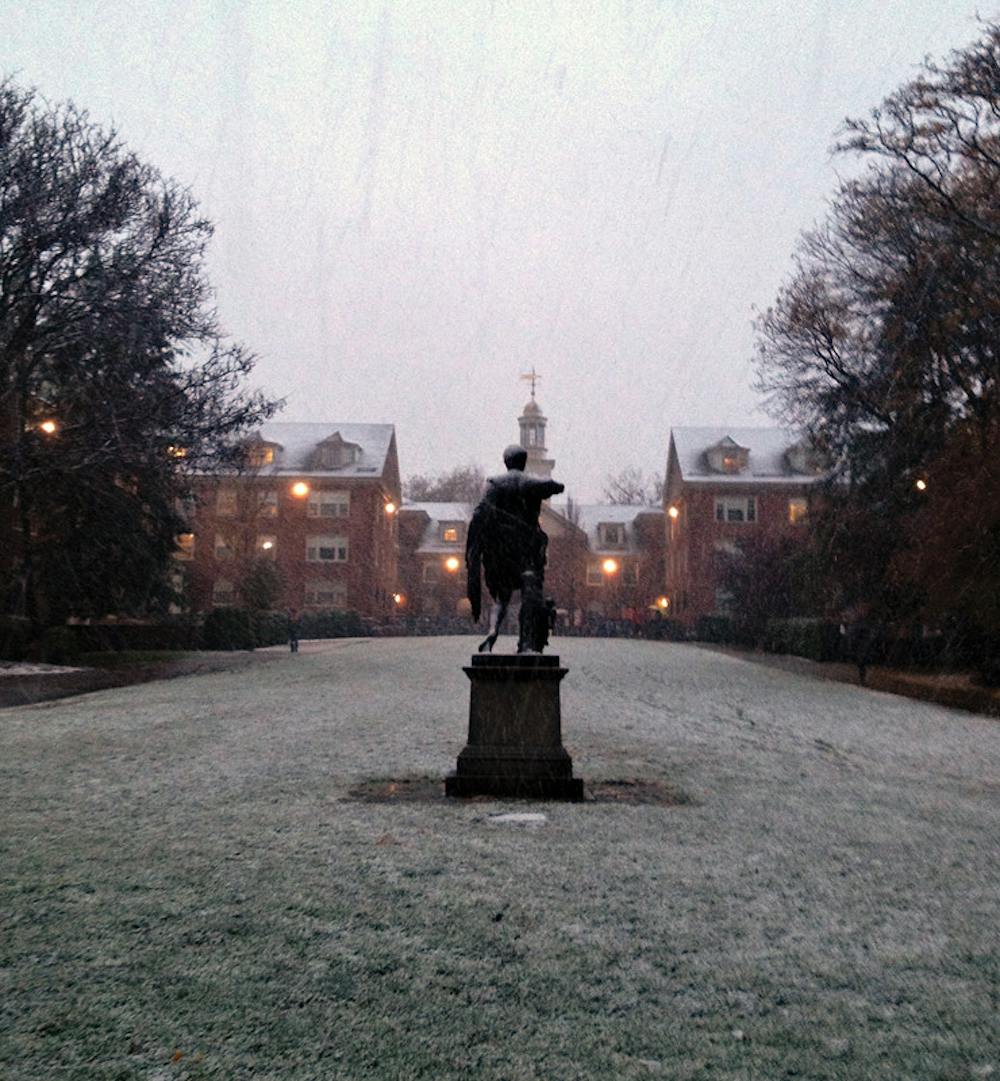Due to warnings about Winter Storm Nemo, which hit New England this morning, the University canceled today’s classes — the third time this academic year administrators have shut down the University due to inclement weather.
The University has not yet made plans to compensate for the lost day of classes, said Provost Mark Schlissel P’15. Dean of the College Katherine Bergeron, Dean of the Graduate School Peter Weber and Schlissel will work together to determine “the best strategy for making up this missed time,” he said.
Though the snow day marks the third missed day of classes this year, Schlissel said the anomalous confluence of days off was hard to explain, given that “the weather is a somewhat random and difficult-to-predict thing.”
Schlissel said the overarching priority of administrators was to ensure the safety of community members, emphasizing concern for staff and faculty members who have to drive to campus. The administration wanted to “err on the side of caution,” Schlissel said, but the coincidence of three days off does not represent “a change in how we think about closing the campus.”
University locales such as the Brown Bookstore, the Blue Room and the Center for Careers and Life After Brown will be closed during the storm.
Because the CareerLAB will be closed Friday and Saturday, no scheduled employer interviews will take place at the office, wrote Andrew Simmons, director of CareerLAB, in an email to The Herald. “CareerLAB staff will assist employers and students to reschedule interviews, or to make alternative arrangements,” he wrote, adding that the LSAT scheduled for Saturday had been canceled.
The beginning of February is typically a major recruitment period for jobs and internships in finance and consulting.
Other local businesses and restaurants plan to remain open in the face of the blizzard.
“We doubled up on supplies, especially milk and bread,” said Richard Kearns, director of customer services at CVS on Thayer Street, which will attempt to remain open in the face of the storm. “We want to make sure everything’s ready so that we can give everyone what they need.”
Ken Maserlian, manager of East Side Marketplace, said the store will “try to stay open as long as possible.”
“We made provisions yesterday for the really important items like milk, bread and water,” Maserlian said. “We’ll try to stay in business and help our customers.”
Students are taking a different approach to storm preparedness.
“Our plan is to hoard a bunch of food from the V-Dub and steal a bunch of bananas,” said Ruthy Gourevitch ’16.
“I bought a snow suit,” said Tobin Tyler ’16. “We have sleds,” she added. “That’s how we’re preparing.”
Officials expect Nemo could blanket New England with over 24 inches of snow — a level that could match or even surpass the blizzard that struck in 1978, known as one of the strongest winter storms ever to hit the area.
That year, then-President Jimmy Carter declared Rhode Island a disaster area, The Herald reported at the time. Three days later, Brown students worked together to unearth the campus in an effort called “Operation Digout.”
The 1978 blizzard left over 29 inches of snow covering Providence, causing 11 snow-related deaths, prompting looters to ravage empty storefronts and effectively halting city operations in their tracks. Three hundred students volunteered to help the Brown community, shoveling both campus and residential walkways. The workforce, spearheaded by the Association of Fraternity Presidents, also staffed hospitals in need and made emergency food deliveries.
“We’ve had enough people to dig out the entire East Side,” then-AFP President Sam Mencoff ’78 P’11 P’15 told The Herald at the time.
Administrative offices were closed and classes canceled for four days as College Hill experienced and recovered from the storm. Five dorms — including French House and Wilbur Hall — were evacuated due to a lack of heating oil, and students were moved to other spaces on campus, The Herald reported at the time.
Students took the inclement weather in stride. “The campus was characterized by an unusual esprit de corps. Only six days into second semester, students were willing to take a vacation and frolic in the snow,” The Herald wrote. In what students and staff referred to as “Winter Weekend,” the University sponsored activities such as a snow sculpture contest and cross-country ski race.
Though it would take Rhode Island weeks to fully recover from the devastating blizzard, then-President Howard Swearer told The Herald that “we seem to be getting slowly plowed out.”

ADVERTISEMENT




